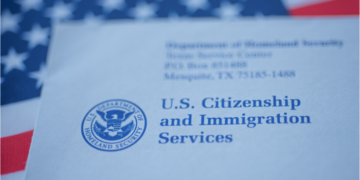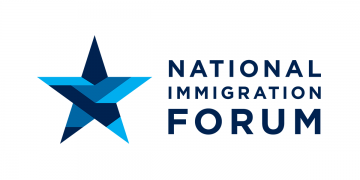[ad_1]
BILLS INTRODUCED AND CONSIDERED
LEGISLATIVE FLOOR CALENDAR
UPCOMING HEARINGS AND MARKUPS
THEMES IN WASHINGTON THIS WEEK
GOVERNMENT REPORTS
SPOTLIGHT ON NATIONAL IMMIGRATION FORUM RESOURCES
BILLS INTRODUCED AND CONSIDERED
S. 4082
A bill to prohibit the use by the Department of Veterans Affairs of funds to provide emergency assistance at the southern border of the United States resulting from the repeal of certain public health orders
The bill would prohibit the Department of Veterans Affairs from using federal funds to provide emergency assistance in response to an emergency at the U.S.-Mexico border directly resulting from the repeal of Title 42.
Sponsored by Senator John Boozman (R-Arkansas) (11 cosponsors— 11 Republicans, 0 Democrats)
04/26/2022 Introduced in the Senate by Senator Boozman
04/26/2022 Referred to the Senate Committee on Veterans’ Affairs
S. 4088
A bill to prohibit the Secretary of Health and Human Services from lessening the stringency of, and to prohibit the Secretary of Homeland Security from ceasing or lessening implementation of, the COVID-19 border health provisions through the end of the COVID-19 pandemic
Sponsored by Senator Ted Cruz (R-Texas) (0 cosponsors)
04/26/2022 Introduced in the Senate by Senator Cruz
04/26/2022 Placed on Senate Legislative Calendar under Read the First Time
04/27/2022 Placed on Senate Legislative Calendar under General Orders
S. 4096
A bill to require U.S. Customs and Border Protection to perform an initial health screening on all detainees
Sponsored by Senator Ben Ray Lujan (D-New Mexico) (2 cosponsors— 2 Democrats, 0 Republicans)
04/27/2022 Introduced in the Senate by Senator Lujan
04/27/2022 Referred to the Senate Committee on the Judiciary
H.R. 7548
Securing Americans from Transportation Insanity Act
The bill would prohibit the use of federal funds to modify the Transportation Security Administration’s (TSA) Standard Operating Procedures (SOP) for sex-based security screenings, including requiring U.S. Customs and Border Protection (CBP) to use gender-neutral language and an individual’s self-identified pronouns or name.
Sponsored by Representative Lauren Boebert (R-Colorado) (11 cosponsors— 11 Republicans, 0 Democrats)
04/21/2022 Introduced in the House by Representative Boebert
04/21/2022 Referred to the House Committee on Homeland Security
H.R. 7549
Seasonal Worker Solidarity Act of 2022
The bill would reform the H-2B guest worker visa program to improve labor standards for guest workers, create a pathway to citizenship for guest workers and their families, and prevent U.S. workers from being passed over for seasonal job opportunities.
Sponsored by Representative Joaquin Castro (D-Texas) (14 cosponsors— 14 Democrats, 0 Republicans)
04/21/2022 Introduced in the House by Representative Castro
04/21/2022 Referred to the House Committee on the Judiciary
H.R. 7579
Western Hemisphere Nearshoring Act
The bill, among various other provisions, would grant authority to the President of the United States to initiate negotiations to obtain cooperation and trade agreements with all Latin American and Caribbean countries as a means to tackle the root causes of migration and become more competitive vis-à-vis China.
Sponsored by Representative Mark Green (R-Tennessee) (2 cosponsors— 1 Democrat, 1 Republican)
04/26/2022 Introduced in the House by Representative Green
04/26/2022 Referred to the House Committees on Ways and Means and on Foreign Affairs
H.R. 7586
Securing the Border for Public Health Act of 2022
The bill would allow the Department of Homeland Security to suspend the entries of people and imports of designated countries as long as it justifies that the suspension would prevent the spread of communicable diseases.
Sponsored by Representative Debbie Lesko (R-Arizona) (1 cosponsor— 1 Republican, 0 Democrats)
04/26/2022 Introduced in the House by Representative Lesko
04/26/2022 Referred to the House Committee on Energy and Commerce
H.R. 7595
To establish the Victims of Immigration Crime Engagement Office within the Department of Homeland Security
Sponsored by Representative Jack Bergman (R-Michigan) (4 cosponsors— 4 Republicans, 0 Democrats)
04/27/2022 Introduced in the House by Representative Bergman
04/27/2022 Referred to the House Committee on the Judiciary
LEGISLATIVE FLOOR CALENDAR
The U.S. Senate will be in session the week of Monday, May 2.
The U.S. House of Representatives will not be in session the week of Monday, May 2.
UPCOMING HEARINGS AND MARKUPS
Hearing: To examine medical mistreatment of women in ICE detention
Date: Tuesday, May 3, 2022, at 10:00 am E.T. (Senate Committee on Homeland Security and Government Affairs)
Location: 562 Dirksen Senate Office Building, Washington, D.C.
Witnesses: TBD
Hearing: Resources and Authorities Needed to Protect and Secure the Homeland
Date: Wednesday, May 4, 2022, at 2:30 pm E.T. (Senate Committee on Homeland Security and Government Affairs)
Location: 2141 Rayburn House Office Building, Washington, D.C.
Witnesses: The Honorable Alejandro N. Mayorkas, Secretary of Homeland Security
Hearing: Securing and Ensuring Order on the Southwest Border
Date: Thursday, May 5, 2022, at 10:15 am E.T. (Senate Committee on Homeland Security and Government Affairs)
Location: 106 Dirksen Senate Office Building, Washington, D.C.
Witnesses: TBD
THEMES IN WASHINGTON THIS WEEK
Federal
Biden Administration Outlines Plan to Address Increases in Migration After End of Title 42
On April 26, the Department of Homeland Security (DHS) published a memorandum that outlines the Biden administration’s plan to manage and secure the southwest border if and when Title 42 restrictions are lifted as planned on May 23. Title 42 is a pandemic-era order that both the Trump and Biden administrations have used since March 2020 to rapidly expel arriving migrants without providing them the opportunity to seek asylum.
The memorandum describes a six-pillar plan that details how the administration plans to address increases in migration. The first pillar is providing additional resources to the border, including personnel, transportation, medical support, and facilities to support border operations. Second, the plan describes efforts to enhance CBP’s processing efficiency to mitigate potential overcrowding at Border Patrol stations and expedite claims for protection made by arriving migrants. The plan also describes additional penalties for repeat border crossers and those attempting to evade detection, efforts to bolster the capacity of non-governmental partners, and enhanced actions to target and disrupt smugglers and transnational criminal organizations. The sixth and final pillar of the plan is a focus on continuing negotiations with Latin American and Caribbean countries to cooperate on migration management.
The memorandum concludes by highlighting that the United States’ outdated immigration system was not built to manage the current levels and types of
migratory flows that the country is experiencing. It urges Congress to pass legislation that would sustainably address the situation at the border.
Despite the release of the plan, the Biden administration continued to receive significant pushback on its decision to roll back Title 42 border restrictions by May 23, including from some moderate Senate Democrats.
White House Funding Request Includes Afghan Adjustment Act, Benefits for Ukrainian Parolees
On April 28, the Biden administration sent a $33 billion supplemental funding request to Congress to continue to address the ongoing fallout from Russia’s invasion of Ukraine. According to reports on April 29, the funding request contains provisions that would offer a pathway to everlasting standing to Afghan evacuees who’ve been resettled within the U.S. beneath parole and at present don’t have any clear choice to remain within the nation. Veterans, religion leaders, and advocacy teams have been calling for the passage of provisions that would offer stability to Afghan parolees within the type of an adjustment act, which has been utilized in earlier parole-based evacuations.
The supplemental funding request additionally reportedly contains provisions that would offer extra advantages to a rising variety of Ukrainian parolees, who at present are solely supplied safety from deportation and the flexibility to use for work authorization.
Secretary Mayorkas Testifies Earlier than Home Committees, Discusses Immigration Insurance policies
On April 27 and 28, Secretary of Homeland Safety Alejandro Mayorkas testified in three congressional hearings earlier than completely different committees to debate the Biden administration’s immigration insurance policies. In his testimony, Secretary Mayorkas highlighted efforts to welcome Ukrainians and Afghans fleeing oppression and justified the administration’s Fiscal 12 months 2023 funding requests for applications all through DHS.
Mayorkas additionally outlined the administration’s technique to safe and handle America’s borders whereas constructing a secure, orderly, and humane immigration system. Mayorkas famous that violence, meals insecurity, poverty, and lack of financial alternative in a number of international locations within the Western Hemisphere are driving unprecedented ranges of migration to the U.S.-Mexico border. He added that the devastating financial influence of the COVID-19 pandemic on the area has solely exacerbated these challenges, whereas human smuggling organizations peddle misinformation to use susceptible migrants for revenue.
Throughout the hearings, Secretary Mayorkas obtained important criticism from Republican representatives, most of whom criticized the administration’s administration of the southern border. A number of Home Republicans have raised the prospect of impeaching Secretary Mayorkas ought to they take the bulk in 2023.
Bipartisan Group of Senators Relaunch Immigration Negotiations
On April 28, Senate Judiciary Chairman Richard Durbin (D-Illinois) met with Senators Thom Tillis (R-North Carolina), Alex Padilla (D-California), and John Cornyn (R-Texas) to debate attainable bipartisan immigration reforms that might garner 60 votes, the minimal wanted to beat a filibuster within the Senate.
The senators mentioned they mentioned a number of matters, comparable to reform to the agriculture-based immigration system, modifications for international employees caught within the inexperienced card backlog, and protections for the greater than 200,000 youngsters who had been introduced into the U.S. legally, however are at risk of “growing older out” of standing at 21 and being compelled to self-deport.
After the assembly, the contributors said that the negotiation was nonetheless within the early phases however expressed satisfaction with resuming immigration-related talks. Senator Padilla, who chairs the Judiciary Committee’s immigration panel, mentioned the group plans to satisfy once more subsequent week, however nothing has been scheduled but.
Biden Administration Launches U.S.-Honduras Strategic Dialogue in Effort to Sort out Root Causes of Migration
On April 26, the Biden administration and the Honduran authorities launched the United States-Honduras Strategic Dialogue to open channels of communication and cooperation between each international locations. The dialogue — proposed by Vice President Harris to Honduras’s President Xiomara Castro — advances joint priorities to handle the foundation causes of migration. Amongst its key parts, the dialogue focuses on financial restoration, and seeks to foster anti-corruption and good governance, enhance human rights protections, scale back gender-based violence, present Covid-19 vaccines and medical gear, help Hondurans in rising their very own border safety, and guarantee a humane administration of irregular migration.
Authorized
Supreme Courtroom Holds Oral Arguments to Decide Whether or not the Biden Administration Might Finish MPP
On April 26, the U.S. Supreme Courtroom held oral arguments to find out whether or not the Biden administration might finish Migrant Safety Protocols (MPP), generally often known as Stay in Mexico. The case, Biden v. Texas, introduced by the states of Texas and Missouri, challenges the administration’s termination of MPP, arguing that in response to statute the Biden administration — and every administration earlier than it — is definitely required to implement MPP so long as it doesn’t have the capability to bodily detain all arriving migrants.
Quickly after taking workplace, the Biden administration stopped enrollment in MPP, and it formally terminated this system in June 2021. Nevertheless, on August 13, a federal choose in Texas dominated that the termination of MPP violated the APA. Therefore, in compliance with courtroom orders, the Biden administration resumed the implementation of MPP on December 6. On December 29, the Biden administration requested the Supreme Courtroom to contemplate its arguments to finish MPP after the Fifth Circuit rejected its attraction on December 14. The Supreme Courtroom granted certiorari to the Biden administration’s petition on February 18.
The usage of MPP on the border has been rising, with over 1,400 preliminary enrollments documented in March alone, up from 896 in February.
US District Courtroom in Louisiana Points Non permanent Restraining Order to Stop Section-Out of Title 42
On April 27, a federal choose in Louisiana quickly blocked the Biden administration from phasing out the implementation of Title 42. Title 42 — set to finish on Might 23 — is a pandemic-era order that each the Trump and Biden administrations have used since March 2020 to quickly expel arriving migrants with out offering them the chance to hunt asylum.
The case Louisiana et al v. Facilities for Illness Management & Prevention et al, stems from a lawsuit filed by Louisiana, Arizona, and Missouri that sought a short lived restraining order in opposition to any winding down of Title 42 earlier than Might 23. Of their lawsuit, the states mentioned there have been indications that many migrants from Guatemala, Honduras, and El Salvador had been already not being subjected to Title 42 expulsions, greater than a month earlier than the scheduled lifting of the order.
The Division of Homeland Safety acknowledged in its response to the movement that it had begun processing some migrants from Central America — about 14 % throughout a current one-week stretch — beneath pre-pandemic tips. Nevertheless, the company mentioned, the migrants weren’t essentially being allowed to stay within the nation, however had been being positioned in expedited elimination proceedings beneath U.S. immigration legislation.
In that regard, a Louisiana federal choose issued a 14-day non permanent restraining order blocking border authorities from phasing out Title 42 whereas the courtroom continued to weigh the states’ arguments. Within the order, the choose indicated he discovered the case in opposition to the administration compelling and seems poised to additional delay the lifting of Title 42.
Texas and Arizona Problem Biden Administration’s Rule on Asylum Processing on the Border
On April 28, Texas and Arizona requested courts to dam a rule that may permit U.S. Citizenship and Immigration Companies (USCIS) asylum officers to adjudicate asylum purposes of sure current border-crossers, assuaging the immigration courtroom case backlog and lessening the wait time for households to have their instances heard.
The rule additionally contains a number of modifications that expedite the asylum software course of and handle some due course of issues for these positioned into expedited elimination proceedings. Below the rule, asylum seekers on the border who move preliminary “credible concern interviews” are positioned right into a non-adversarial, well timed asylum adjudication course of carried out by USCIS asylum officers.
Within the go well with, the state of Texas argued that the promulgation of the asylum rule – which is about go into impact on Might 31 — violates the Administrative Procedures Act. The go well with additional claims that the rule “upends all the adjudicatory system to the advantage of aliens.”
State & Native
Tennessee Governor Indicators into Regulation Bipartisan Invoice that Permits DACA Recipients to Apply for Skilled and Business Licenses
On April 26, Tennessee Governor Invoice Lee signed into legislation a brand new invoice that allows international nationals who’ve been granted both Deferred Motion for Childhood Arrival (DACA) or Non permanent Protected Standing (TPS) to acquire skilled and industrial licenses so long as they meet all different necessities of the licensing board. The bipartisan modification was accredited by the Tennessee Home (56-35) and the Tennessee Senate (20-7) and was transmitted to the Governor on April 22. The brand new legislation will permit roughly 7,000 DACA recipients and three,000 TPS holders the flexibility to acquire skilled licenses.
The act was handed to handle labor shortages which have impacted practically 50% of small enterprise house owners in Tennessee, who’ve been unable to fill job openings. Below the established order, many DACA recipients and TPS holders who’ve been raised and educated in Tennessee have left for different states the place they will legally get hold of skilled licenses. This invoice will imply that non-U.S. residents with work authorization will now not want to depart the state to search out employment.
GOVERNMENT REPORTS
Congressional Analysis Service (CRS), “Non permanent Protected Standing and Deferred Enforced Departure,” April 19, 2022
This report presents an summary of the weather, background, and international locations at present designated for Non permanent Protected Standing (TPS) and Deferred Enforced Departure (DED). TPS is a provision that enables the Division of Homeland Safety to designate international locations experiencing civil unrest, violence, or pure disasters to stop the elimination of nationals of such nations from the US. As of February 16, 2021, roughly 354,625 international nationals from twelve international locations who’re dwelling in the US are protected by TPS. DED is a short lived, discretionary, administrative keep of elimination granted to immigrants from designated international locations. Not like TPS, a DED designation emanates from the President’s constitutional powers to conduct international relations and has no statutory foundation. Sure Liberians, Venezuelans, and residents of Hong Kong current in the US at present preserve aid beneath DED.
Division of Homeland Safety Workplace of Inspector Normal (DHS-OIG), “Violations of ICE Detention Requirements at South Texas ICE Processing Heart,” April 22, 2022
This OIG report highlights that the South Texas U.S. Immigration and Customs Enforcement (ICE) Processing Heart in Pearsall, Texas, failed to satisfy ICE detention requirements that compromised the well being, security, and rights of detainees. Notably, it failed to satisfy requirements for grievances, segregation, COVID-19 response, and communications with detainees.
SPOTLIGHT ON NATIONAL IMMIGRATION FORUM RESOURCES
Addressing Will increase in Migration on the Southwest Border
This up to date useful resource supplies coverage suggestions that may create extra humane and environment friendly border processing, refocus on regional approaches that fight trafficking networks and handle the foundation causes of migration, and enact sensible border safety fixes that handle key remaining vulnerabilities.
Explainer: Uniting for Ukraine
This useful resource explains the weather of the Uniting for Ukraine program, launched by the Biden administration on April 21, to supply Ukrainian residents who’ve fled Russia’s unprovoked warfare of aggression alternatives to come back to the U.S.
Explainer: Title 42 and What Comes Subsequent on the Border
This explainer supplies extra details about the Title 42 border coverage, its influence on the border, and what’s going to occur when the coverage is lifted on Might 23.
* * *
*This Bulletin is just not meant to be complete. Please contact Arturo Castellanos-Canales, Nationwide Immigration Discussion board Coverage and Advocacy Affiliate, with feedback and strategies of extra gadgets to be included. Arturo may be reached at acastellanos@immigrationforum.org. Thanks.
[ad_2]
Source link

































